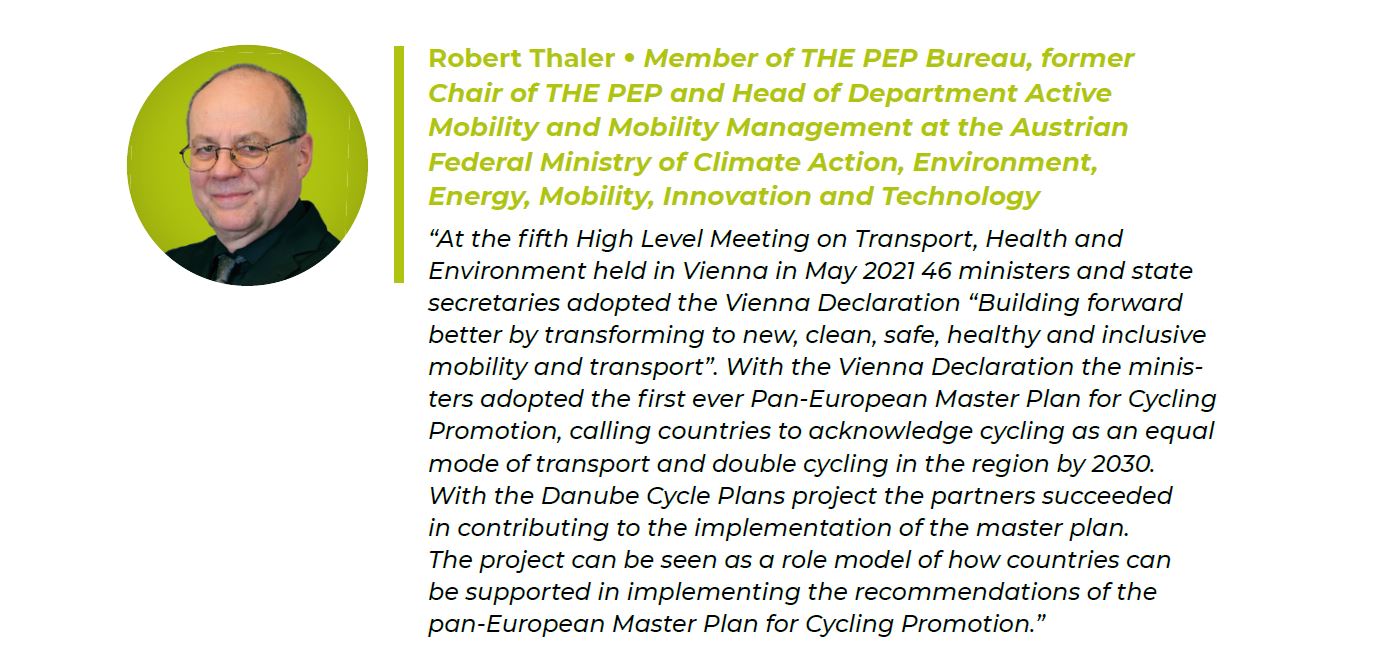Danube Cycle Plans - Danube Cycling strategy aims at more people cycling in the region
21-12-2022
Cycling is one of the most environmentally friendly modes of transport. Given the fact that the transport sector is one of the main GHG emitters and the only sector in which emissions have increased since 1990, promoting cycling is an important climate change mitigation activity. However, conditions for cycling in the Danube region differ a lot. Some countries are more experienced, whereas in other countries the importance of cycling is barely recognised. In general, cycling is treated as a side topic rather than an equal mode of transport. Responsibility for cycling is fragmented at subnational level. Regional/local authorities can be highly effective as engines of cycling promotion, but do not receive sufficient financial, legislative and political support from national/transnational level to work effectively.
Download the Danube Cycling Strategy >HERE<

In the Danube Cycling Strategy (DCS), partners of the Danube Cycle Plans project develop a common vision for the promotion of cycling in the Danube region. The vision and the objectives set up in the strategy reflect the identified challenges regarding cycling in the Danube region. The strategy development process brought together the relevant national ministries participating in the project as project partners or associated strategic partners (ASP). It acts as a policy driver at macro-regional level inspiring key actors at national and EU level.
Recommendations summarized for different topics break down the objectives into specific actions. For the identification of relevant actions, the pan-European Masterplan for Cycling Promotion as well as the draft EU Cycling Strategy provided valuable inputs. While some recommendations address the trans-national level (EUSDR, EU, UNECE, etc.) others target the national level. The cooperation with the SABRINA project resulted in the integration of three/four additional recommendations covering cycling safety.

This vision is to be achieved by focusing actions on nine specific objectives:
- Objective 1: To coordinate efforts in the Danube region, building on the common history, culture, traditions, as well as reflecting the diversity of countries and people;
- Objective 2: To significantly increase cycling in every country to contribute to the overall target of doubling cycling in the Danube region as a whole;
- Objective 3: To increase the overall transport system’s resilience by reallocating space in favour of cycling, walking and other active modes;
- Objective 4: To build, extend and improve the infrastructure for cycling transport, recreational cycling, cycling tourism in every country in the region;
- Objective 5: To develop and implement measurable national cycling policies, supported by national cycling
- plans, strategies and programmes including the setting of national targets in every country in the region;
- Objective 6: To significantly increase cyclists’ safety in every country in the region as a whole;
- Objective 7: To integrate cycling into health policies, including those tackling non-communicable diseases and obesity;
- Objective 8: To integrate cycling, including cycling infrastructure, into land use, urban, regional and transport infrastructure planning.
- Objective 9: To increase the quality of cycle tourism (infrastructure and services) in the Danube region as a whole and the number of cycling tourists
By following these objectives, the countries of the Danube region will contribute significantly to the objectives defined in the pan-European Master Plan for Cycling Promotion.

The Danube Cycling Strategy should provide the strategic background for the improvement of the conditions for cyclists in the Danube Region. It should support decision-makers on the national, macro-regional and European levels to set the action for cycling. At the end as many actions recommended in this strategy as possible should find their way in relevant policies at the national level. Furthermore, the partners of the DCP project are providing a contribution to any upcoming update of the Action Plan of the European Strategy for the Danube Region (EUSDR).
